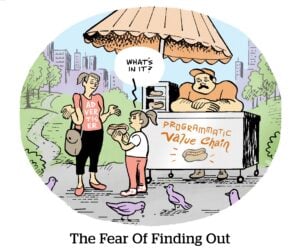Remember, back in the ’90s, when AOL seemed like the internet’s Goliath? Well, Goliath ultimately fell.
That brings me to Google, the present-day internet Goliath.
The advertising giant’s financials are strong today, but it’s facing several threats: advertiser discontent, legal minefields, a shift in search advertising budgets toward new platforms and retail sites, and everyone’s favorite existential threat: AI.
The question isn’t whether Google will fall, but whether its time is near. And, if so, what will finally bring it down?
Advertiser discontent won’t stop Google, but it does hurt
Recent headlines illustrate Google’s advertiser challenges.
There’s the revelation that the company manipulated its search ads auctions to squeeze more money out of advertisers without their knowledge.
There are scathing reports from independent research firm Adalytics, which most recently shed light on Google’s problematic Search Partner Network (SPN). Adalytics found that brands buying Google search ads were sometimes found on pornographic or sanctioned sites. Google responded by allowing buyers to opt out of SPN for all campaign types, including Performance Max (PMax), its AI-driven buying tool. That was an admission of guilt.
Finally, there’s the never-ending agony over the demise of the third-party cookie. As Machiavelli famously observed, it’s better to be feared than loved. Most advertisers have viewed Google as a necessary evil. But if advertisers start believing that the company is actually hurting their business with its plan to phase out third-party cookies in Chrome, they may no longer love or fear it.
Antitrust will slow Google down
Google’s all-encompassing control over advertisers and publishers – the source of the industry’s fear – is increasingly under threat.
In a case brought forth by game-maker Epic, a jury recently found that Google turned its Google Play app store and Google Play Billing service into an illegal monopoly.
Interestingly, Apple, Google’s only real app store rival, prevailed in a similar case. One big difference between the cases was the revelation that Google had offered sweetheart deals to smartphone makers and certain app developers – including zero fees for Spotify and just 10% fees for Netflix.
But, from a legal standpoint, the app store isn’t Google’s only liability. The company is facing two more antitrust cases.
Consider the Justice Department’s upcoming ad tech monopoly trial. One potential outcome of that case could be that Google is forced to spin off some of its ad tech stack. That wouldn’t be ideal, but it wouldn’t cripple the company either. Ad tech is somewhat of a loss leader for Google anyway.
Then there’s the search monopoly case, which wrapped up arguments in November. Search advertising is still the beating heart of Google’s business.
While we don’t know what the outcome of the search monopoly case will be, one possibility is that Google might not be allowed to be the default search engine on iOS devices. Losing a foothold with Apple’s highly profitable consumer base could hurt Google.
And if retailers and TikTok continue to steal search market share, Google’s problems in search could worsen.
The straw that could break Google’s back: AI
But Google’s biggest competitive threat is AI, which could fundamentally change how consumers access and use information.
The company clearly understands the existential stakes. In a blog post announcing Gemini, Google’s AI-powered search solution, CEO Sundar Pichai wrote: “I believe the transition we are seeing right now with AI will be the most profound in our lifetimes, far bigger than the shift to mobile or to the web before it.”
Did you get that? Pichai is saying AI is a bigger deal than the digital revolution that gave us Google in the first place.
The trouble is that Google has already delayed Gemini. And they have a mishmash of confusing AI brands in the market, including Gemini, Bard, DeepMind, etc.
Meanwhile, OpenAI jumped out to an early lead with ChatGPT, which became the fastest-growing consumer application of all time. To make things worse, a weird power struggle at OpenAI gave Google rival Microsoft even greater control over ChatGPT.
And there are more AI search tools joining the market all the time!
It’s been more than a decade since Google was in a real search war. But between the rise of TikTok, the growth of retail search (Amazon, Walmart, Target, etc.) and the AI revolution, a new search war is already underway. And Google is losing ground.
To be sure, Google controls important markets and has a lot of talent and money. But it is also distracted by present dramas when it most needs to focus on building for the future. And it needs to build fast.
Google is roughly at the same point now as AOL was when Google founders Sergey Brin and Larry Page were building their search engine in a garage. That means the next Goliath could already be poised to take over.
“Data-Driven Thinking” is written by members of the media community and contains fresh ideas on the digital revolution in media.
Follow U of Digital and AdExchanger on LinkedIn.
For more articles featuring Shiv Gupta, click here.
















